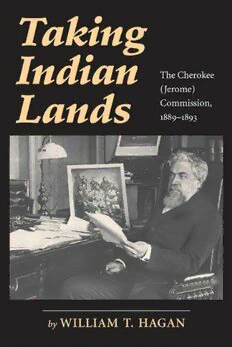Download Taking Indian Lands: The Cherokee (Jerome) Comission 1889-1893 PDF Free - Full Version
Download Taking Indian Lands: The Cherokee (Jerome) Comission 1889-1893 by William Thomas Hagan in PDF format completely FREE. No registration required, no payment needed. Get instant access to this valuable resource on PDFdrive.to!
About Taking Indian Lands: The Cherokee (Jerome) Comission 1889-1893
Authorized by Congress in 1889, the Cherokee Commission was formed to negotiate the purchase of huge areas of land from the Cherokees, Ioways, Pawnees, Poncas, Tonakawas, Wichitas, Cheyennes, Arapahos, Sac and Fox, and other tribes in Indian Territory. Some humanitarian reformers argued that dissolving tribal holdings into individual private properties would help “civilize” the Indians and speed their assimilation into American culture. Whatever the hoped-for effects, the coerced sales opened to white settlement the vast “unused” expanses of land that had been held communally by the tribes. In Taking Indian Lands, William T. Hagan presents a detailed and disturbing account of the deliberations between the Cherokee Commission and the tribes.Often called the Jerome Commission after its leading negotiator, David H. Jerome, the commission intimidated Indians into first accepting allotment in severalty and then selling to the United States, at it price, the fifteen million acres declared surplus after allotment. This land then went to white settlers, making possible the state of Oklahoma at the expense of the Indian tribes who had held claim to it.Hagan has mined nearly two thousand pages of commission journals in the National Archives to reveal the commissioners’ dramatic rhetoric and strategies and the Indian responses. He also records the words of tribal leaders as they poignantly defended their attachment to the land and expressed their fears of how their lives would be changed.
Detailed Information
| Author: | William Thomas Hagan |
|---|---|
| Publication Year: | 2003 |
| ISBN: | 9780806180038 |
| Pages: | 290 |
| Language: | English |
| File Size: | 3.032 |
| Format: | |
| Price: | FREE |
Safe & Secure Download - No registration required
Why Choose PDFdrive for Your Free Taking Indian Lands: The Cherokee (Jerome) Comission 1889-1893 Download?
- 100% Free: No hidden fees or subscriptions required for one book every day.
- No Registration: Immediate access is available without creating accounts for one book every day.
- Safe and Secure: Clean downloads without malware or viruses
- Multiple Formats: PDF, MOBI, Mpub,... optimized for all devices
- Educational Resource: Supporting knowledge sharing and learning
Frequently Asked Questions
Is it really free to download Taking Indian Lands: The Cherokee (Jerome) Comission 1889-1893 PDF?
Yes, on https://PDFdrive.to you can download Taking Indian Lands: The Cherokee (Jerome) Comission 1889-1893 by William Thomas Hagan completely free. We don't require any payment, subscription, or registration to access this PDF file. For 3 books every day.
How can I read Taking Indian Lands: The Cherokee (Jerome) Comission 1889-1893 on my mobile device?
After downloading Taking Indian Lands: The Cherokee (Jerome) Comission 1889-1893 PDF, you can open it with any PDF reader app on your phone or tablet. We recommend using Adobe Acrobat Reader, Apple Books, or Google Play Books for the best reading experience.
Is this the full version of Taking Indian Lands: The Cherokee (Jerome) Comission 1889-1893?
Yes, this is the complete PDF version of Taking Indian Lands: The Cherokee (Jerome) Comission 1889-1893 by William Thomas Hagan. You will be able to read the entire content as in the printed version without missing any pages.
Is it legal to download Taking Indian Lands: The Cherokee (Jerome) Comission 1889-1893 PDF for free?
https://PDFdrive.to provides links to free educational resources available online. We do not store any files on our servers. Please be aware of copyright laws in your country before downloading.
The materials shared are intended for research, educational, and personal use in accordance with fair use principles.

